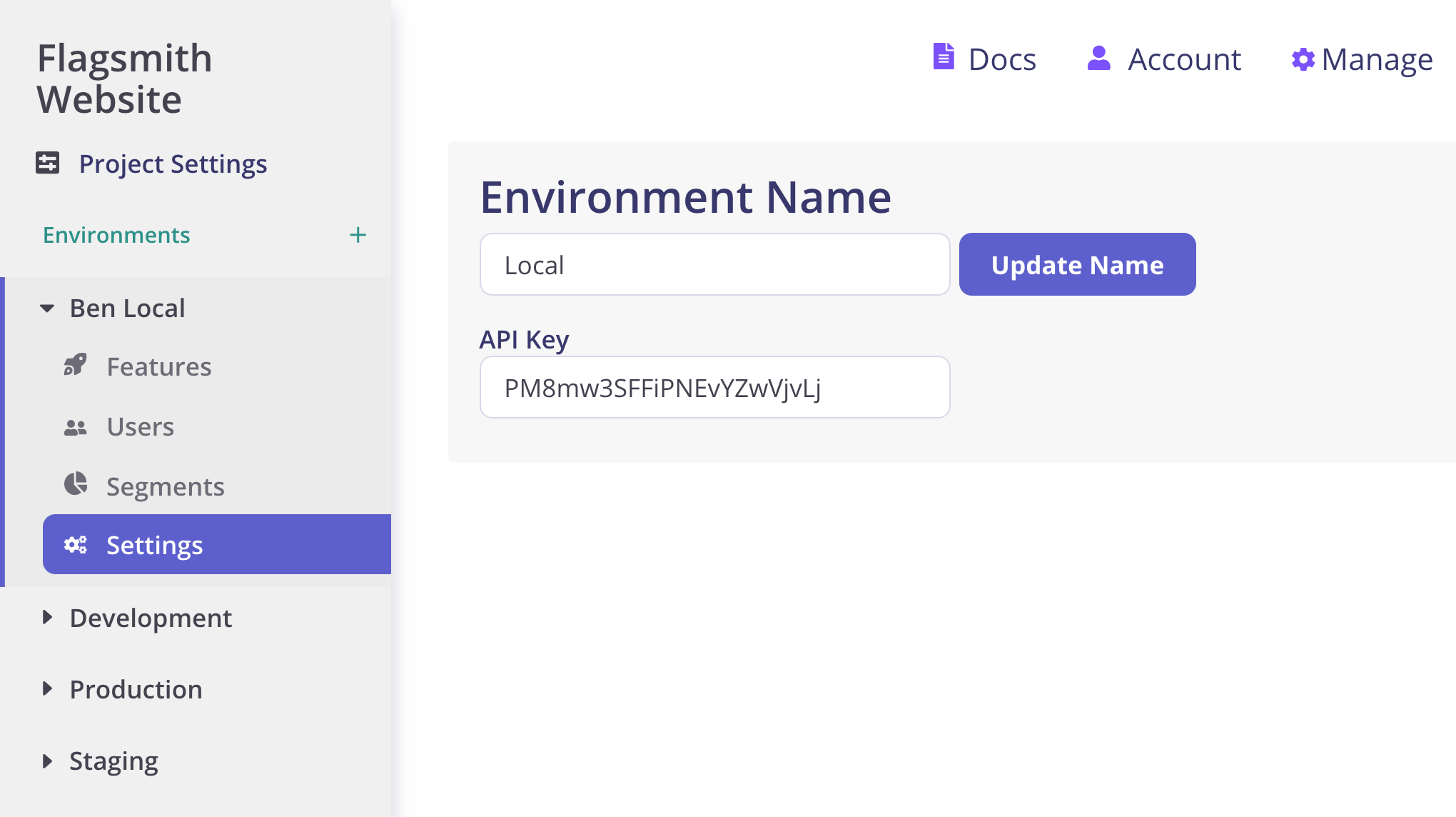Flagsmith iOS SDK
This library can be used with iOS and Mac applications. The source code for the client is available on Github.
Installation
CocoaPods
CocoaPods is a dependency manager for Cocoa projects. For usage and installation instructions,
visit their website. To integrate Flagsmith into your Xcode project using CocoaPods, specify it in your Podfile:
pod 'FlagsmithClient', '~> 1.0'
Swift Package Manager
The Swift Package Manager is a tool for automating the distribution of Swift code and is integrated into the swift
compiler. You can use it to install Flagsmith by adding the description to your Package.swift file:
dependencies: [
.package(url: "https://github.com/Flagsmith/flagsmith-ios-client.git", from: "1.1.1"),
]
Basic Usage
The SDK is initialised against a single environment within a project on https://flagsmith.com, for example the Development or Production environment. You can find your Client-side Environment Key in the Environment settings page.

Initialization
Within your application delegate (usually AppDelegate.swift) add:
import FlagsmithClient
func application(_ application: UIApplication, didFinishLaunchingWithOptions launchOptions: [UIApplication.LaunchOptionsKey: Any]?) -> Bool {
Flagsmith.shared.apiKey = "<YOUR_API_KEY>"
// The rest of your launch method code
}
Now you are all set to retrieve feature flags from your project. For example to list and print all flags:
Flagsmith.shared.getFeatureFlags() { (result) in
switch result {
case .success(let flags):
for flag in flags {
let name = flag.feature.name
let value = flag.value?.stringValue
let enabled = flag.enabled
print(name, "= enabled:", enabled, "value:", value ?? "nil")
}
case .failure(let error):
print(error)
}
}
Note that you can use:
flag.value?.stringValueflag.value?.intValueflag.value?.floatValue
Based on your desired type.
To retrieve a feature flag boolean value by its name:
Flagsmith.shared.hasFeatureFlag(withID: "test_feature1", forIdentity: nil) { (result) in
print(result)
}
To retrieve a config value by its name:
Flagsmith.shared.getFeatureValue(withID: "test_feature2", forIdentity: nil) { (result) in
switch result {
case .success(let value):
print(value ?? "nil")
case .failure(let error):
print(error)
}
}
These methods can also specify a particular identity to retrieve the values for a user registration. See Identities , using the forIdentity parameter.
To retrieve a trait for a particular identity (see Traits):
Flagsmith.shared.getTraits(forIdentity: "test_user@test.com") {(result) in
switch result {
case .success(let traits):
for trait in traits {
let name = trait.key
let value = trait.value
print(name, "=", value)
}
case .failure(let error):
print(error)
}
}
Swift Concurrency
When running with Swift version 5.5.2 and greater (Xcode 13.2), async versions of the Flagsmith API become available.
These are provided using the generic
withCheckedThrowingContinuation(function:_:)
Swift api, to wrap the closure based syntax. The async/await syntax provides a streamlined execution flow leading to
greater code clarity. For example:
/// (Example) Setup the app based on the available feature flags.
func determineAppConfiguration() async throws {
let flagsmith = Flagsmith.shared
if try await flagsmith.hasFeatureFlag(withID: "ab_test_enabled") {
if let theme = try await flagsmith.getFeatureValue(withID: "app_theme") {
setTheme(theme)
} else {
let flags = try await flagsmith.getFeatureFlags()
processFlags(flags)
}
} else {
let trait = Trait(key: "selected_tint_color", value: "orange")
let identity = "4DDBFBCA-3B6E-4C59-B107-954F84FD7F6D"
try await flagsmith.setTrait(trait, forIdentity: identity)
}
}
Override default configuration
By default, the client uses a default configuration. You can override the configuration as follows:
Override just the default API URI with your own:
func application(_ application: UIApplication, didFinishLaunchingWithOptions launchOptions: [UIApplication.LaunchOptionsKey: Any]?) -> Bool {
Flagsmith.shared.apiKey = "<YOUR_API_KEY>"
Flagsmith.shared.baseURL = "https://<your-self-hosted-api>/api/v1/"
// The rest of your launch method code
}